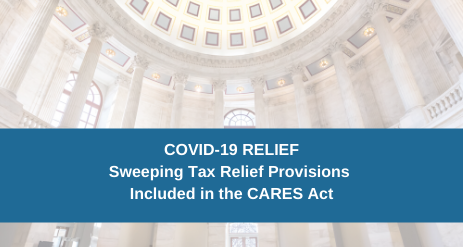
In an effort to help businesses and individuals weather the economic storm created by the coronavirus shutdowns, the Coronavirus Aid, Relief, and Economic Security (CARES) Act, which Congress passed and the President signed on March 27, included many provisions easing restrictions imposed by the Internal Revenue Code. Key Changes relating to businesses are highlighted below. Changes oriented toward individual taxpayers will be covered in a separate Alert.
Payroll Tax Deferral. Regardless of whether it has been adversely affected by the pandemic, an employer may elect to defer payment of the employer share of social security taxes and pay those taxes in equal installments on December 31, 2021, and December 31, 2022. For self-employed taxpayers (including owners of entities taxed as partnerships), the deferral applies to 50% of the self-employment tax liability. If the employer receives a loan under the SBA loan program and has the loan forgiven (explained below), however, deferral cannot extend beyond December 31, 2020. Most employers should take advantage of this deferral election since it will give them more cash flow in the short run, at no tax cost.
Employee Retention Tax Credits. The CARES Act provides employers with a credit against 2020 employment taxes, which is available if the employer has either (i) suffered a 50% drop in gross receipts versus the corresponding quarter in 2019 or (ii) been forced to either fully or partially suspend operations. If eligibility is triggered by a 50% drop in gross receipts, eligibility for the credit will continue in 2020 until quarterly gross receipts exceed 80% of gross receipts for the corresponding 2019 quarter. The credit is equal to 50% of the wages paid to each eligible employee, capped at a credit of $5,000 per employee per quarter. If the company has no more than 100 employees, wages paid to all employees are taken into account. If the company has more than 100 employees, however, only those employees who are no longer able to work due to the pandemic or economic dislocation are eligible to be taken into account. This is a refundable credit; if the amount of the credit exceeds the amount otherwise payable as employment taxes, the excess amount will be paid by the federal government to the employer.
An important limitation on the availability of this credit is that it is not available if the employer receives a loan under the SBA loan program and has the loan forgiven (explained below).
Special Net Operating Loss Carryback Provisions. Since 2017, taxpayers have not been permitted to carry back net operating losses (NOLs). The CARES Act provides a special 5-year NOL carryback period for tax losses generated in 2018 through 2020. This will allow taxpayers to obtain cash refunds quickly for taxes paid in prior years. Companies with NOLs in 2018 and 2019 that paid taxes in the prior 5 years should consider whether to file for these carrybacks.
Interest Limitations. Since 2017, certain businesses have been limited in the amount of interest expense deduction that may be claimed in any year. The limit had been 30% of EBITDA, but the CARES Act increases the limit to 50% of EBITDA. A special rule applies to partnerships. For partnerships, the 50% limitation applies only for 2020, and 50% of the interest not deductible in 2019 will be deductible in 2020 without limitation.
Forgiveness for CARES Act SBA-Guaranteed Loans. One of the key provisions of the CARES Act was the institution of a massive loan program for small to mid-sized businesses. Businesses apply for these loans through the SBA and repayment is guaranteed by the federal government. Normally a taxpayer must recognize income when its obligation to repay a loan is forgiven. The CAREs Act provides a huge exception to this rule. If certain employee retention and use of loan proceeds requirements are met, a borrower under this program will not only be relieved of its obligation to repay the loan but will also be relieved of the obligation to take the amount of the loan forgiveness into income. In effect, this converts the loan into a federal government grant.
Corporate Charitable Contributions. The CAREs Act increases the limitation on charitable contribution deductions for C corporations from 10% to 25%. The limitation on charitable donations of food inventory is increased from to 25% for all businesses.
For questions about this and other COVID-19 related tax developments, please contact Bob Canter or TJ Wilkinson at Shulman Rogers.
The contents of this Alert are for informational purposes only and do not constitute legal advice. If you have any questions about this Alert, please contact the Shulman Rogers attorney with whom you regularly work or a member of the Shulman Rogers Tax Law Group.
Stay up to date with all the latest news and events.